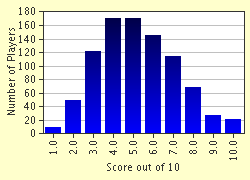Quiz Answer Key and Fun Facts
1. A behavioural psychologist would probably say which of these?
2. A sample of 50 school-aged children are given either a pill with a certain medication in it, or a placebo. Before starting the experiment, and then after taking the pills for two weeks, the children fill out a survey about their energy level. The dependent variable is
3. These research techniques are all descriptive:
4. True or false: The forebrain includes the thalamus, cerebrum, and cerebellum.
5. According to Diana Baumrind (1991), in order to be classified as an authoritarian parent, you would have
6. A child is playing with a toy. When you hide the toy, she makes no effort to look for it. According to Jean Piaget, the child is in which stage of cognition?
7. If you were looking for an employee who could find minute differences between small objects, ideally he would have
8. If you are in an altered state of consciousness, which of the following are you probably doing?
9. The method of Classical Conditioning begins with
10. True or False: According to Atkinson and Shiffren, when your mind is processing information for your memory, sensory input travels from the working store, to the sensory store, to the long-term store.
Source: Author
janna_chy
This quiz was reviewed by FunTrivia editor
crisw before going online.
Any errors found in FunTrivia content are routinely corrected through our feedback system.

